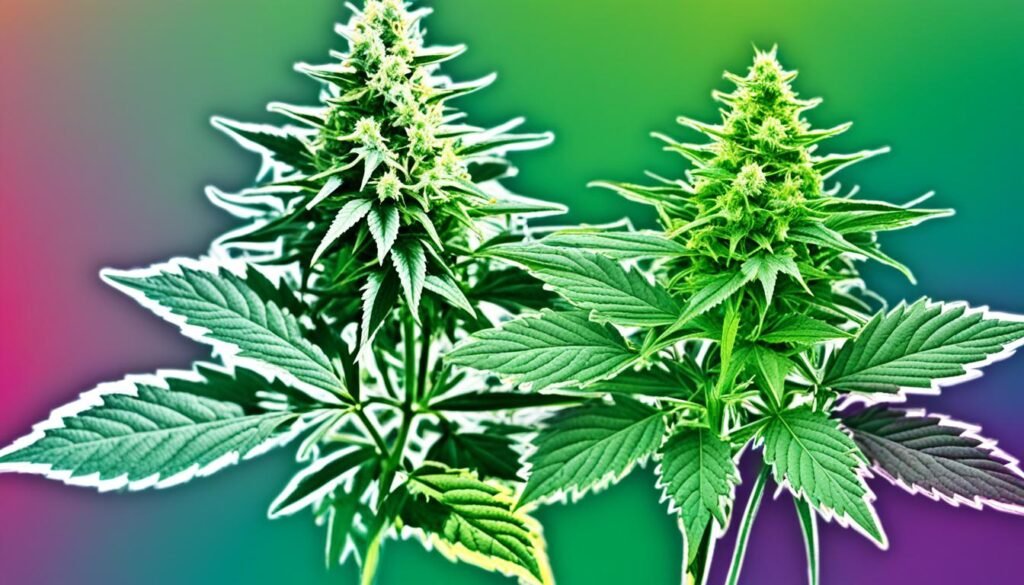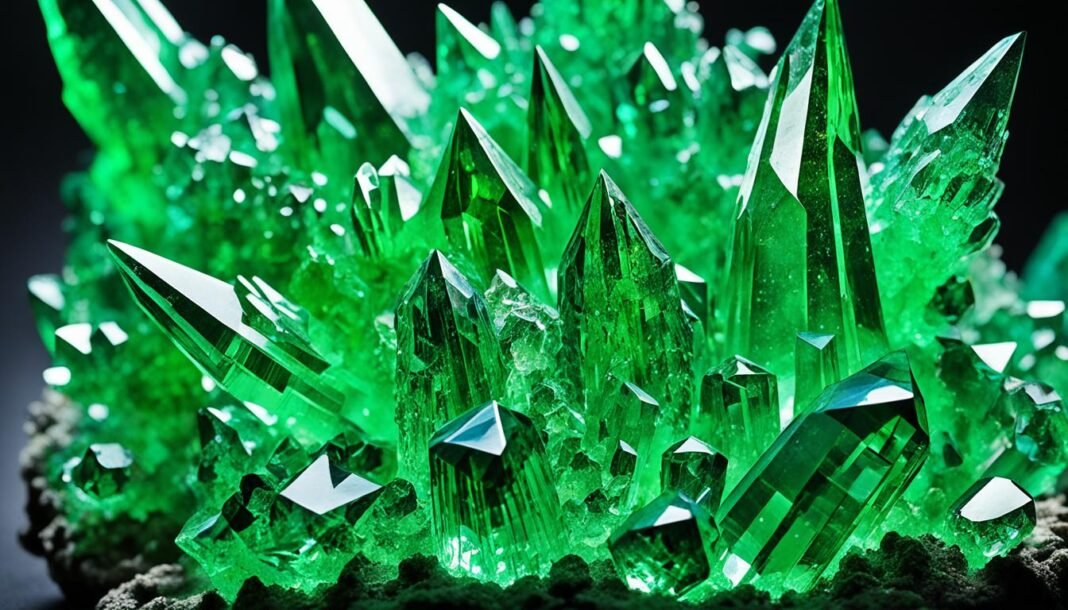THCP, or tetrahydrocannabiphorol, is a new cannabis compound gaining attention. This potent cannabinoid is closely related to THC (tetrahydrocannabinol). THCP’s unique properties and potential applications are exciting researchers and enthusiasts alike.
Scientists are exploring THCP’s fascinating world. They’re uncovering its science, effects, and future implications. This discovery could reshape our understanding of cannabis compounds.
Key Takeaways
- THCP is a newly discovered cannabinoid that is closely related to THC, the primary psychoactive compound in cannabis.
- THCP is thought to be significantly more potent than THC, with potential implications for both recreational and medicinal use.
- Researchers are exploring the unique properties and potential benefits of THCP, including its potential applications in pain management and mental health.
- The legal status of THCP is still evolving, with varying regulations across different regions.
- As the research on THCP continues, it is expected to provide valuable insights into the complex world of cannabis compounds and their therapeutic potential.
What is THCP?
THCP, or tetrahydrocannabiphorol, is a newly discovered cannabinoid. Researchers first found it in 2019. It’s considered a novel cannabinoid due to its unique properties.
Understanding the Basics of THCP
THCP is similar to THC, the main psychoactive compound in cannabis. However, THCP has a longer side chain than THC. This difference in structure may affect how THCP works in the body.
THCP: A Novel Cannabinoid Compound
As a novel cannabinoid, THCP is less studied than THC or CBD. Scientists are still learning about its properties and potential uses. The discovery of THCP has opened new paths in cannabinoid research.
Researchers are eager to understand how THCP might impact cannabis science. Its full implications remain to be seen.
“The discovery of THCP has the potential to significantly impact our understanding of the cannabis plant and the vast array of compounds it can produce.”
| Compound | Structure | Potency |
|---|---|---|
| THC | C₂₁H₃₀O₂ | Moderate |
| THCP | C₂₅H₃₈O₂ | Potentially Higher |
The Potent Effects of THCP
THCP is a new cannabinoid that’s much stronger than THC. It may bind to CB1 receptors 33 times more than THC. This leads to more intense and longer-lasting thcp effects.
The increased potency makes THCP attractive for some cannabis users. However, it raises safety concerns. The effects may be harder to predict and control than regular THC products.
Research on THCP is still new. The long-term effects of this potent cannabinoid are unknown. Always talk to a doctor before using THCP or any cannabis product.
| Compound | Binding Affinity to CB1 Receptors |
|---|---|
| THC | 1.0 |
| THCP | 33.0 |
This table shows how much stronger THCP is compared to THC. The binding affinity of THCP is 33 times higher than THC.
“THCP is a fascinating new compound that has the potential to revolutionize the cannabis industry, but its potency also raises important safety concerns that need to be carefully addressed.”
More research on THCP is needed. Users, doctors, and regulators must watch its development closely. Safe and responsible use of this potent cannabinoid is crucial.
How THCP Compares to Other Cannabinoids
THCP has caught the attention of scientists studying cannabinoids. This new compound differs from THC in important ways. Let’s explore the key distinctions between THCP and THC.
THCP vs. THC: Similarities and Differences
THCP and THC are both plant-based cannabinoids from cannabis. They interact with the body’s endocannabinoid system, binding to CB1 receptors. However, THCP may bind more strongly, causing stronger psychoactive effects.
The molecular structure sets THCP apart from THC. THCP has a longer side chain with seven carbon atoms. THC’s side chain only has five. This difference makes THCP more potent.
THCP and the Endocannabinoid System
The endocannabinoid system helps maintain balance in the body. It includes receptors, enzymes, and signaling molecules. THCP’s strong binding to CB1 receptors may cause various effects.
These effects could include pain relief, mood changes, and altered perception. More research is needed to fully understand THCP’s impact. Studying THCP’s unique properties will help us learn about its potential uses.

The Legal Status of THCP
THCP’s legal status is a hot topic. This new cannabinoid has sparked interest and questions about its legality. In the US, cannabis compound laws and novel cannabinoid regulations differ greatly between states.
Some areas may see THCP as a legal hemp derivative. Others might class it as a controlled substance. This puts THCP in a legal gray area or even bans it outright.
The thcp legality puzzle shows how complex cannabinoid rules are. Users and sellers must research local laws carefully. What’s legal in one state might be illegal in another.
“The legal status of THCP is a moving target, with significant variations between states. Staying up-to-date on the latest novel cannabinoid regulations is essential for anyone interested in this emerging compound.”
THCP’s legal future is still unfolding. More research and policy talks will shape its status. Keeping track of regulatory updates is key for those interested in THCP.
Potential Medical Applications of THCP
Scientists are exploring THCP’s medical potential. Early studies suggest it may help with pain management and mental health. Research is still in its early stages.
THCP for Pain Management
THCP shows promise for chronic pain, inflammation, and neuropathic conditions. It may have strong analgesic properties, offering new pain management options.
THCP interacts with the endocannabinoid system. This interaction could help control pain signals and reduce inflammation. Many people with chronic pain might find relief through THCP.
THCP and Mental Health
THCP may also benefit mental health. Studies hint at its anxiolytic and antidepressant-like effects. This could help people with anxiety and depression.
THCP may address neurological and biochemical factors of mental health issues. This could lead to a more complete approach to mental wellness.
Research on THCP’s medical uses is still new. More studies are needed to understand its full potential. Long-term safety and effectiveness also require further investigation.
“The exploration of THCP’s medical applications is an exciting frontier in the world of cannabis research. As our understanding of this compound grows, we may uncover innovative solutions for managing pain and promoting mental health.” – Dr. Sarah Williamson, leading cannabis researcher
Extracting and Isolating THCP
Obtaining pure THCP from hemp or cannabis plants is a complex process. It requires specialized expertise and cutting-edge equipment. THCP is scarce in most cannabis strains, making extraction challenging and costly.
Extractors use advanced techniques like chromatography to separate and concentrate THCP. This meticulous process impacts the availability and affordability of THCP products for consumers.
To extract and isolate THCP, skilled professionals follow a multistep process. Here are the key stages:
- Primary Extraction: The initial extraction of cannabinoids from the plant material, often using solvents like CO2 or ethanol.
- Chromatographic Separation: Advanced chromatography techniques, such as high-performance liquid chromatography (HPLC) or supercritical fluid chromatography (SFC), are used to isolate THCP from the cannabinoid-rich extract.
- Purification and Concentration: Further purification and concentration steps are undertaken to achieve a high-purity THCP isolate, ready for incorporation into final products.
THCP extraction and isolation require technical expertise and specialized equipment. Currently, only a few manufacturers can produce this novel cannabinoid at scale.
As research and development progress, more THCP-based products may become available. This could lead to increased options for consumers in the future.
| Extraction Technique | Advantages | Disadvantages |
|---|---|---|
| CO2 Extraction |
|
|
| Ethanol Extraction |
|
|
The extraction and isolation of thcp, cannabinoid isolation, and hemp processing are crucial for developing new products. As the industry grows, we’ll see more advancements in these techniques.
This progress may lead to increased availability and affordability of this unique cannabinoid. The future of THCP-based products looks promising for consumers.

Dosing and Safety Considerations for THCP
THCP is a potent cannabinoid that needs careful dosing. Safe use is key for a positive experience. Users should be aware of its strong effects.
THCP is stronger than THC. Even small amounts can produce strong psychoactive effects. It’s vital to start with extremely low doses. Increase slowly until you reach the desired effect.
Ask healthcare providers or experienced users for guidance. They can help you use THCP safely and responsibly.
Research on THCP’s cannabinoid safety is limited. The compound appears to interact with the endocannabinoid system like THC. This suggests possible benefits and risks.
- Carefully monitor thcp dosing and pay attention to individual reactions.
- Avoid driving or operating heavy machinery after consuming THCP-infused products.
- Those with pre-existing medical conditions or taking medications should consult a healthcare professional before using THCP.
THCP is a novel compound with evolving usage. Users should prioritize safety and responsible consumption. Understanding THCP can help explore its benefits while reducing risks.
“THCP is a powerful compound that requires cautious and informed usage. Responsible dosing and consideration of personal health factors are crucial for a positive experience.”
The Future of THCP Research
THCP research is rapidly evolving in the scientific community. This novel compound has captured researchers’ attention due to its potential therapeutic uses. Scientists are eager to uncover its full range of applications.
Exploring the Therapeutic Potential of THCP
Future studies on THCP may explore its efficacy for various medical conditions. Researchers are intrigued by its potential for pain management, given its potent analgesic properties. The compound’s anti-inflammatory effects could also help treat inflammatory disorders.
Mental health is another key area for THCP research. Early findings suggest it may have neuroprotective and mood-regulating qualities. These properties could lead to treatments for anxiety, depression, and neurodegenerative diseases.
| Potential Therapeutic Applications of THCP | Potential Benefits |
|---|---|
| Pain Management | Potent analgesic effects |
| Inflammation Reduction | Anti-inflammatory properties |
| Mental Health Disorders | Neuroprotective and mood-regulating qualities |
Researchers are working to optimize THCP extraction and production methods. This will help increase its accessibility and affordability for consumers. It’s a crucial step in unlocking the compound’s full therapeutic potential.
“The future of THCP research remains promising, but further exploration is needed to fully understand its impact on human health and well-being.”
THCP research is still in its early stages, but its future looks bright. As scientists unravel its mysteries, new therapeutic applications are likely to emerge. These discoveries could improve the quality of life for many people.
Where to Find THCP Products
THCP is a new cannabinoid gaining attention in wellness circles. Consumers are eager to find these innovative thcp products. Though limited, there are options for those interested in this potent compound.
When buying cannabinoids like THCP, choose reputable vendors with transparent practices. The THCP market lacks regulation, so research brands thoroughly. Check their testing methods, ingredient lists, and customer feedback.
Consult healthcare providers or experienced cannabis users for advice. They can offer insights on purchasing novel compounds safely and responsibly.
THCP products may be found in specialty cannabis or hemp stores. These are more common in states where THCP is legal. Online retailers specializing in new cannabinoids are another option.
| Retail Channel | Availability | Considerations |
|---|---|---|
| Specialty Cannabis/Hemp Stores | Limited | Conduct research on product quality and vendor reputation |
| Online Retailers | Moderately Available | Vet vendors thoroughly, prioritize transparency and testing |
The THCP market is still developing. Approach thcp products with care and diligence. Stay informed and choose trustworthy providers. This way, you can explore THCP’s potential benefits safely.
Conclusion
THCP, a new potent cannabinoid, has sparked excitement in the cannabis industry. It’s more effective than THC and THCP offers a unique set of potential benefits. However, we still need to learn about its long-term effects and safety.
Research on THCP is ongoing. Consumers should stay informed and talk to their doctors about using THCP products. This article gives a full picture of THCP and the science behind it.
THCP’s future looks bright, but we must approach it carefully. Safety, rules, and responsible growth should be top priorities. Scientists are still uncovering THCP’s secrets.
This research could lead to new treatments. It may also help us understand the endocannabinoid system better. The journey of discovery with THCP continues to push boundaries.
